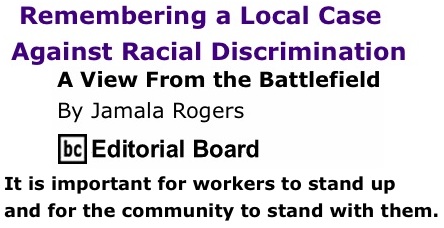

We can’t sit on our laurels when our enemies are working 24-7.
When an organizer is going to the mat for justice, he or she never
knows the final destination of that struggle. May 14 is the 40th
anniversary of Green vs. McDonnell Douglas.
What started off as a local struggle by venerable activist, Percy
Green, became a landmark case in the fight against racial
discrimination in employment. Green’s name will be forever connected
with McDonnell Douglas (now Boeing Corporation).
Under the leadership of Percy Green, the organization ACTION busted
loose jobs for black folks during the 60s and 70s in St. Louis,
especially for black men. Utility companies like Laclede Gas and
corporations like Southwestern Bell (now AT&T) often went into
siege mode when ACTION put them on “the list.”
ACTION used aggressive and creative tactics in the 1960s to knock down
the racist doors that led to more employment. What the group called
guerilla theater included sit-ins, stick-ins, paint-ins, chain-ins,
walk-ins and whatever was necessary to make their point. For those who
were around during this time, these are vivid memories.
Most people in Green’s hometown of St. Louis are unaware of Green’s
tangle with one of the world’s biggest and most powerful
multinationals. They remember other, more daring feats like Green and
fellow ACTION member, Richard Daly, climbing the St. Louis Arch in 1964
to protest the lack of minority contractors on the job. The
construction was summarily halted and black workers were hired to
complete the historic monument that pierces the St. Louis downtown
skyline.
It is probably those in the legal arena who are most aware of Green vs
McDonnell Douglas as it is a case that is likely to turn up in a law
school syllabus for mandatory study and gets written about in law
review publications.
Green filed a discrimination suit against the company in 1964 after he
was laid off, allegedly due to workforce reduction. Green declared the
layoff was retaliatory because McDonnell Douglas had been the target of
ACTION for not hiring more black workers. When the company opened up
Green’s former job and he applied for it, he was denied. Now the
company’s motives were clear and Green declared them unfair and racist.
He filed suit with the Equal Employment Opportunity Commission (EEOC)
in 1964.
Green’s case was heard in the U.S. District
Court, the U.S. Court of Appeals, and ultimately before the U.S.
Supreme Court. St. Louis civil rights attorney Lou Gilden argued the
case before the High Court on March 28, 1973. Warren E. Burger was the
Chief Justice. On May 14 of the same year, SCOTUS ruled in favor of
Percy Green. The decision was unanimous, 9-0.
The decision was a landmark case because it completely changed the way
racial discrimination cases had been viewed. It now put the burden on
the employer to prove they had not been discriminatory in their
policies. Before this case, plaintiffs had to prove “intent,” which was
damn near impossible to do. Since its issuance in 1973, all the federal
courts have subsequently adopted the framework set out in this opinion
for all claims of employment discrimination that are not based on
direct evidence of discriminatory intent.
Green had no idea the case would go all the way to the top or that the
case would end up in the history books. While he was motivated to
challenge an injustice that started off with his own employment, Green
knew that the same racial discrimination was happening to many other
black workers at the time. The fight was much bigger than him.
Eric Vickers, another St. Louis civil rights attorney, reminded me that
despite the hits it has taken, the case remains a cornerstone of
American law.
“The standard set by the court in Percy's case spread like wildfire to
be applied to every type of discrimination case in American law.”
Vickers goes on to say that “unfortunately, major blows have been
struck to the standard set in Percy's case by subsequent conservative
supreme court cases, causing the bar to be raised substantially and
significantly higher to prove a discrimination case.”
It should be a reminder to all of us in the social justice movement
that we must continue to fight if we are to maintain the victories we
have won.
At a time when workers’ rights are under assault in this country, it
may feel like were going in circles. The United Mineworkers Union had
to file a suit against Patriot and Peabody Coal companies when they
tried to pull an okey-doke on workers’ benefits under the cloak of
bankruptcy. Fast food workers are fighting for livable wages and better
working conditions. The Green vs. McDonnell Douglas decision is
affirmation that it is important for workers to stand up and for the
community to stand with them because we are all beneficiaries of those
struggles.
BlackCommentator.com Editorial Board member and Columnist, Jamala Rogers, founder and Chair Emeritus of the Organization for Black Struggle in St. Louis. She is an organizer, trainer and speaker. She is the author of The Best of the Way I See It – A Chronicle of Struggle. Click here to contact Ms. Rogers.
 |







